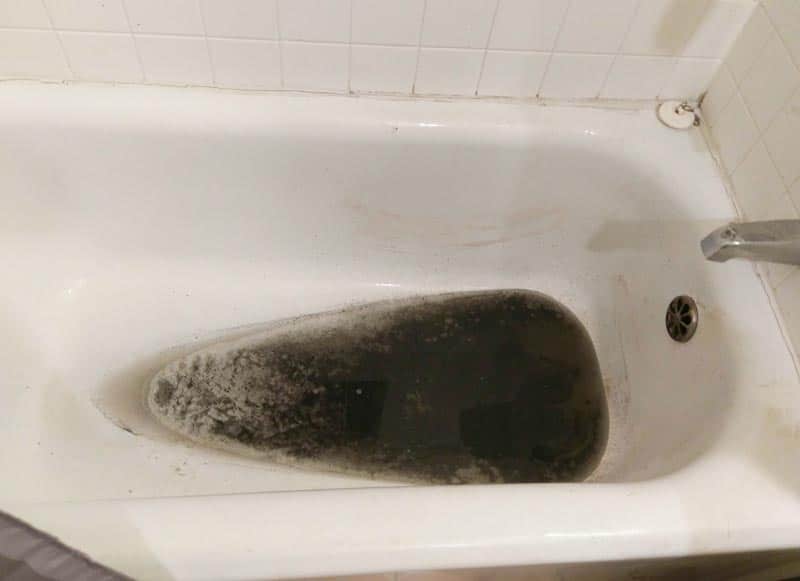Important Explanations for Effluent in the Bathtub
Important Explanations for Effluent in the Bathtub
Blog Article
This great article following next relating to Water Coming up Bathtub Drain is particularly entertaining. You should look it over.

Sewage backup in the bathtub can be a traumatic and unhygienic problem for any type of homeowner. Not only is it troublesome, however it likewise positions major wellness threats and shows underlying concerns with the plumbing system. Understanding why sewage is coming up through the tub is important for taking ideal activity to attend to the problem successfully.
Intro to the Issue
Recognizing the Trouble
When sewer draws back up right into the bathtub, it's a clear sign of a trouble with the drain system. The wastewater that needs to be moving away from your home is rather discovering its back right into your living space, which can bring about substantial damage and carcinogen.
Possible Causes
Numerous factors can contribute to sewer back-up in the bath tub. From clogs in the sewage system line to issues with the plumbing infrastructure, identifying the origin is vital for discovering a solution.
Typical Factors for Sewer Back-up
Clogs in the Sewer Line
One of one of the most usual causes of sewage backup is a blockage in the sewage system line. This can occur due to the build-up of particles, grease, or foreign things in the pipes, protecting against proper circulation and triggering sewer to back up into your tub.
Tree Root Intrusion
Tree roots seeking wetness and nutrients can penetrate drain lines via small fractures or joints. Gradually, these roots can grow and increase, creating considerable damage to the pipelines and causing sewage back-up problems.
Aging Facilities
Older homes may have dated plumbing systems that are much more at risk to deterioration, splits, and degeneration. As pipelines age, they come to be a lot more vulnerable to leakages and blockages, enhancing the possibility of sewage backup cases.
Heavy Rainfall or Flooding
During periods of heavy rainfall or flooding, the drain system might become overloaded with excess water, triggering backups and overflows. This can result in sewage supporting into bath tubs and various other components inside the home.
Health Dangers Related To Sewer Back-up
Contamination of Water
Sewage backup can infect the water system in your home, positioning a serious health risk to you and your family members. Exposure to infected water can bring about gastrointestinal concerns, skin infections, and other diseases.
Spread of Disease
Sewer consists of dangerous germs, viruses, and bloodsuckers that can create a range of conditions, consisting of hepatitis, cholera, and gastroenteritis. Coming into contact with sewage or polluted surface areas puts you in jeopardy of infection.
Mold and mildew Growth
Wetness from sewer backup can develop perfect problems for mold and mildew growth in your house. Mold and mildew spores can exacerbate respiratory issues and cause allergies in sensitive people, making punctual cleanup important.
Indicators of Sewer Backup
Foul Odors
Undesirable odors rising from drains or fixtures, particularly in the restroom, might show sewage back-up problems. These smells are usually strong and persistent, indicating an issue that calls for immediate interest.
Slow Draining Fixtures
Bath tubs, sinks, and toilets that drain pipes gradually or otherwise in any way could be experiencing sewage backup. If multiple components are affected concurrently, it's likely that the concern originates from a typical factor, such as the main drain line.
Gurgling Noises
Strange gurgling or bubbling noises coming from drains pipes when water is running in other places in your home are a measure of air trapped in the plumbing system. This air buildup can result from sewage backup and ought to be explored without delay.
Immediate Actions to Take
Switching Off Water Supply
In case of sewer backup, it's necessary to turn off the supply of water to prevent further contamination and damages. Find the main water shutoff valve in your house and shut it off up until the issue can be resolved.
Speaking To an Expert Plumber
Dealing with sewer backup is not a DIY task. Contact an accredited plumber with experience in handling sewage-related concerns to assess the situation and do needed repairs or cleanings.
Preventing Contact with Infected Water
Until the sewage backup is dealt with, avoid contact with polluted water to avoid the spread of bacteria and virus. Wear safety equipment if you must remain in the afflicted area and clean your hands thoroughly later.
Preventive Measures
Routine Upkeep of Sewer Lines
Schedule regular evaluations and upkeep of your sewage system lines to identify and resolve possible problems before they escalate into significant troubles. This can include cleaning out particles, inspecting for tree origin breach, and repairing any broken pipelines.
Setting Up Backwater Shutoffs
Take into consideration setting up bayou valves in your plumbing system to stop sewage from flowing back right into your home throughout periods of heavy rainfall or flooding. These valves automatically close when water starts backing up, securing your property from contamination.
Appropriate Disposal of Home Waste
Stay clear of purging anything other than bathroom tissue and human waste down the bathroom to avoid blockages and obstructions in the sewer line. Dispose of grease, oil, and other family chemicals correctly to minimize the danger of plumbing issues.
Tidying up After Sewer Backup
Sanitation Procedures
Completely decontaminate and disinfect influenced locations after sewage back-up to remove unsafe germs and prevent mold and mildew development. Usage ideal cleaning items and protective equipment to ensure secure and reliable clean-up.
Repair of Influenced Areas
Fix any damages to floor covering, wall surfaces, or fixtures triggered by sewage back-up. Relying on the extent of the damages, you may need to replace carpets, drywall, or other products to restore your home to its pre-loss problem.
Why is There Sewage Coming Up Through the Bathtub
Sewage in your bathtub is a major problem that can make you want to abandon the bathroom for good. You don’t have to. However, it is important to identify the source of the issue and take the necessary steps to resolve it in order to avoid any health risks and property damage. In this article, we will discuss what could be causing sewage to back up through your bathtub so you can take action quickly and effectively.
The Main Reason For Sewage Backup in The Bathtub
All the sinks and toilets in your home connect to different pipes that lead to the main sewer line. The sewer line then connects to the municipal sewer system. This connection works seamlessly on a daily basis, but there can sometimes be a problem with the main sewer line.
The most common cause of sewage backup is a clogged or blocked main sewer line. The main sewer line can be clogged due to the accumulation of debris, tree roots or grease buildup, or other materials. Another possible cause is a collapsed pipe. When this happens, your toilets and sinks won’t be able to drain properly. This is when sewage starts backing up through the bathtub. If the problem has been occurring for some time now, it might be time to consult with a plumber as there may be more severe damage that needs fixing.
How Can You Tell if it’s Coming From Your Sewer Line?
If you’re experiencing a sewage backup in your bathtub, then you can use a few simple methods to determine if it is coming from the main sewer line. First, try to unclog the tub drain with a plunger or an auger and see if that helps. If not, then inspect all of the drains in your house and check if there is any blockage in them. If some of the other drains are not working fine, then it’s likely the problem is with your main sewer line.
Common Signs of a Clogged Main Sewer Line
If you suspect that your main sewer line is blocked, then there are a few common signs to look out for. Frequent clogs in your home are a sure sign of a clogged sewer line. You can also check for slow drainage from all the plumbing fixtures.
Slow Drains
If you notice that it takes longer for your sinks and toilets to drain, then this could be a sign of a clogged main sewer line.
Frequent Clogs
Another common sign is that your drains or toilets become clogged almost all of the time. If this happens, then it could be a sign that the main sewer line is blocked.
Water Backup
Do you notice water or sewage coming back up from any of the drains in your home? If your answer is yes, you may have a clogged main sewer line.
Sinkholes
If you’ve noticed sinkholes in your yard or overflowing sewage from the ground, you may be facing a blocked sewer line issue.
Your Shower or Sink Makes Gurgling Noises
Have you noticed gurgling noises coming from your sink or shower lately? These are typically signs of a blocked sewer line and should be checked out immediately.
How to Prevent a Main Sewer Line Clog
Once you’ve identified that your main sewer line is clogged, it’s important to take steps to prevent it from happening again. The best way to do this is to avoid putting any solid material that can clog the drain, such as grease and other debris. You should also be mindful of what you flush down your toilet. In addition, you should schedule regular maintenance for your main sewer line. This will help keep it clear and free from clogs or backups.
What Should You do if You Notice Sewage Backing up Through The Bathtub?
If you’ve noticed sewage backing up through the bathtub, then it is important to call a professional plumber immediately. A plumber can inspect the situation and determine what the cause is, such as a blocked main sewer line. They will also be able to advise you on how best to fix the issue. In some cases, a simple drain cleaning may be all that is needed.
However, if the blockage is severe, then your plumber may need to use more advanced methods to clear the blockage.
No matter what, it is important to always call a professional plumber if you experience any kind of sewage backup. They will be able to assess the situation and provide you with a solution that is best for your home.
https://baylorinc.com/blog/why-is-there-sewage-coming-up-through-the-bathtub/

As a serious reader on Why sewage is coming up through your bathtub, I think sharing that article post was a good idea. Sharing is good. You just don't know, you may very well be doing someone a favor. Thank you so much for your time spent reading it.
Schedule Service
Report this page